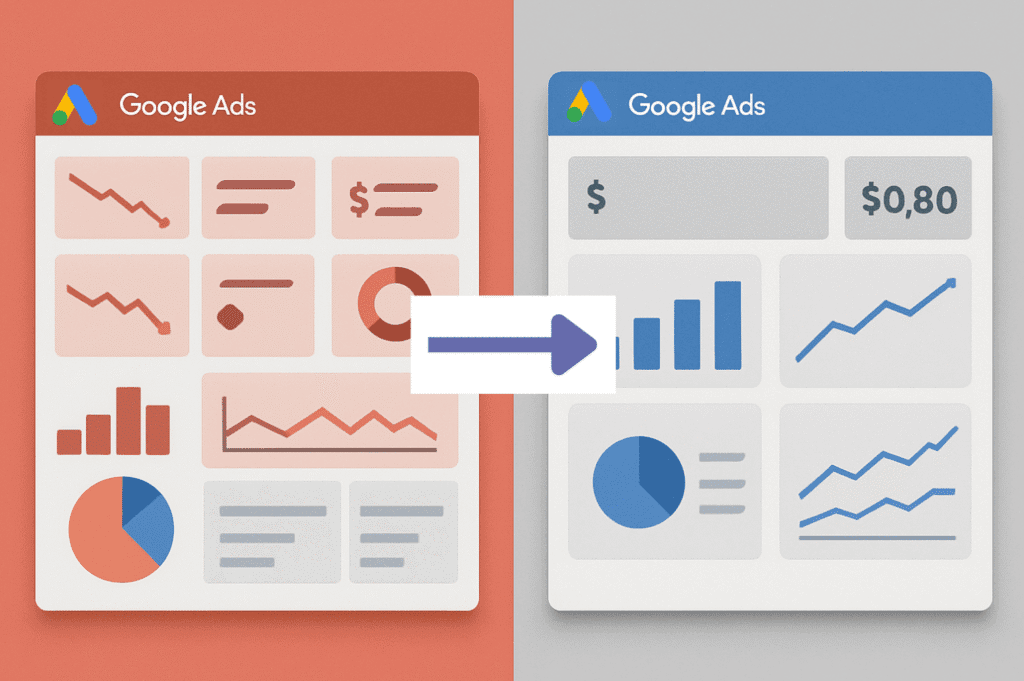
You’re spending $5,000+ monthly on Google Ads with declining performance. The clicks come in, reports look professional, but your cost per acquisition keeps climbing while conversion rates stay flat.
As a PMP-certified marketer who has managed PPC campaigns across dozens of languages and markets, I see similar systemic problems repeatedly. The issue usually isn’t your ads or keywords. It’s the lack of analytical discipline in campaign management.
The Core Problem: Treating PPC as Creative, Not Analytical
The Issue: In my experience, many businesses treat Google Ads as a creative marketing activity instead of recognizing it as an analytical system requiring systematic management.
Why This Matters: Without structured processes and disciplined optimization cycles, you can’t understand performance variables or isolate which changes drive results.
Common Patterns I Observe:
- Campaign structures appear random and disorganized, introducing chaos that makes optimization nearly impossible.
- Overlapping keywords compete against each other across campaigns, driving up costs and confusing performance analysis.
- Keyword management becomes complicated at scale, especially negative keyword coordination across multiple campaigns.
- Business owners make daily reactive adjustments based on yesterday’s data without strategic planning.
- Accounts lack clear testing methodology or defined success metrics.
Campaign Architecture: Foundation for Success
The Problem: I often see accounts where the hierarchical structure becomes chaotic. A single account contains many campaigns and ad groups targeting everything from broad industry terms to specific products in a disorganized way, making optimization nearly impossible.
The Solution: Systematic campaign structure that unlocks proper testing and measurement.
Best Practices:
- Single focus per campaign: Each campaign should target one product, service, or customer segment where possible.
- Tight ad group structure: Ad groups work best with 5-15 closely related keywords.
- Match type hierarchy: Start with exact match, expand to phrase, then use broad match modifier.
- Disciplined negative keywords: Conduct regular search term reviews to eliminate wasted spend.
Optimization Without Data: The Daily Adjustment Trap
The Problem: I frequently encounter business owners making constant bid changes, keyword additions, and budget shifts without statistical significance.
Why This Fails: PPC optimization requires adequate sample size and time to gather meaningful performance data.
Structured Testing Approach:
- Minimum test periods: Allow 2+ weeks for meaningful changes to generate reliable data.
- Single variable testing: Isolate one element at a time to measure true impact.
- Statistical requirements: Wait for adequate sample size before making optimization decisions.
- Sprint methodology: Use focused optimization cycles with clear hypotheses and success metrics.
Account-Level Performance Factors
Often Overlooked Elements:
- Quality Score issues: Structural problems can prevent efficient ad delivery and increase costs.
- Search term waste: Irrelevant clicks consume budget without generating qualified leads.
- Bidding strategy misalignment: Using the wrong approach for your account’s data maturity level.
- Conversion tracking problems: Attribution accuracy issues can skew optimization decisions.
Quick Wins:
- Regular negative keyword audits can recover significant amounts of wasted spend.
- Quality Score improvements often unlock better ad positions at lower costs.
- Proper bidding strategy selection matches your data availability to appropriate automation levels.
- Technical audits can verify attribution accuracy and resolve tracking issues that skew optimization decisions.
The Systematic Approach
Project Management Framework for PPC:
Planning Phase:
- Clear campaign objectives must be aligned with overall business goals.
- Success metrics should be defined upfront with specific measurement requirements.
- Resource allocation should follow expected testing timeline and budget requirements.
Execution Phase:
- Structured campaign builds should follow established architectural best practices.
- Testing calendars need predetermined optimization triggers and review schedules.
- Regular performance reviews should include statistical analysis of meaningful changes.
Results Businesses Typically See:
- Meaningful improvements in cost per conversion often occur within the first quarter.
- Significant reductions in wasted ad spend happen through better negative keyword management.
- More predictable performance patterns enable confident budget scaling decisions.
- Clearer understanding develops of which campaigns drive actual business results versus just traffic.
When to Seek Professional Help
Consider PPC expertise if:
- You’re not getting results or seeing declining performance from your Google Ads campaigns.
- Account structure feels chaotic despite following Google’s automated recommendations.
- You can’t clearly explain which specific campaigns drive your best customers.
- Performance varies dramatically month-to-month without clear attribution or explanation.
- Time spent on daily management exceeds the strategic value you’re receiving.
Key Takeaways
Essential Points:
- Systems thinking beats tactical adjustments: Treat PPC as a complex system that requires structured management rather than reactive daily changes.
- Architecture enables optimization: Proper campaign structure allows for meaningful testing and reliable measurement of results.
- Statistical discipline prevents waste: Wait for significance before making optimization decisions instead of reacting to daily fluctuations.
- Account maintenance matters: Regular technical audits help prevent performance ceilings that limit growth potential.
- Match strategy to maturity: Bidding approach must align with your account’s data availability and conversion volume.
The Bottom Line
Google Ads success requires analytical discipline and systematic optimization rather than marketing intuition alone. Combining PPC expertise with project management methodology turns chaotic accounts into predictable growth engines.
The goal isn’t just improved metrics – it’s disciplined optimization that delivers measurable business results through structured testing and data-driven decision making.
To schedule a Google Ads audit consultation:
